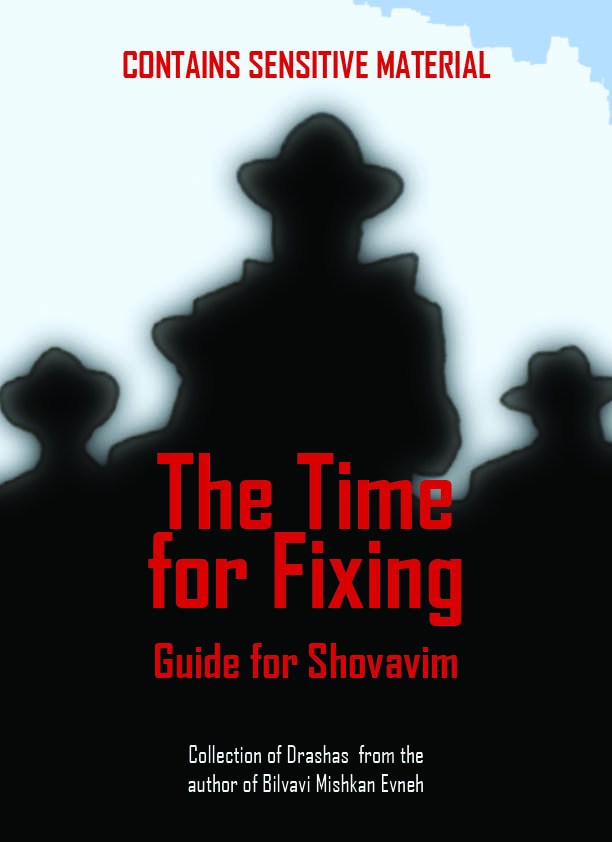- בלבבי ה_עמוד יב_יסודות העבודה
012 Fundamentals of Avodah
- בלבבי ה_עמוד יב_יסודות העבודה
Bilvavi Part 5 - 012 Fundamentals of Avodah
- 7231 reads
- Printer-friendly version
- שלח דף במייל
בלבבי. חלק ה. יסודות העבודה עמ' יב – כו
Fundamentals In Avodas Hashem (The Need For Hisbodedus\Solitude)
1.
The Ramchal (in sefer Derech Eitz Chaim) writes as follows: “Those who are in control over their evil inclination did this and have taught others how to do it. A person, throughout the many years of his life, mostly thinks about his worldly matters; why can he not put his heart into one hour of thinking about thoughts such as: “What am I? Why did I come onto this world? What does the King of all kings, Hakadosh Baruch Hu, want from me? What will be with me in the end?
“This is the greatest remedy that one can use to counter his evil inclination, and it is easy to implement and is very effective; it brings much gain. It is that a person should set aside every day one hour which is free from all thoughts, and just think about this and ask himself: “What did the forefathers do, who had such an intense desire for Hashem? What did Moshe Rabbeinu do? What did Dovid Hamelech do, and all of the great leaders who came before us?”
“…A person who never thinks about this will find it very difficult to reach perfection, while a person who does think about it is very close to perfection. It is the way of the wise to always think as they walk, and they do not forget about such thoughts. That is why they are successful. But every person should at least dedicate time for this, whether it is a small amount of time or a large amount, and think about this – and then he will be successful.”
2.
If a person really wants to serve Hashem in a true way, then he must realize what the Ramchal has said here. The Ramchal has written here that without an hour of reflection every day into thinking about one’s purpose in life, it will be too difficult to reach perfection. One should understand that this practice is the basis of everything he wants to work on. One needs at least an hour every day of reflection, and if he can do more, even better (the Chofetz Chaim did reflection for two hours every day, as is well known). But without at least one hour, it is too difficult to be successful in Avodas Hashem. The Ramchal writes that without this, it is impossible to defeat the yetzer hora, who is much stronger than us.
3.
This is a matter which one needs to clarify for himself. A person needs to ask himself if he is ready to reflect every day with this soul, for at least an hour. If you are ready to do this, that’s very good, and now one can proceed to learn how to do it.
But if a person’s isn’t ready for this hour of daily reflection – either because he thinks he doesn’t need to, or because he thinks that it’s too hard for him to do (and usually, this is the reason), then this sefer is not meant for him. This is not an exaggeration. For one who understands why we need to have this daily reflection, the matter is very simple, but for one who doesn’t do this hour of daily reflection, this seems like an absurd practice to do.
4.
How do we reflect, and what should we do during this time of reflection? This will be explained in the coming lines, in simple words, so that anyone who truly seeks Hashem can do it, using his abilities.
5.
The first thing a person needs for this is to designate a quiet place that is away from people (the reader should refer back to the preface and see what we mean), and then he should begin to talk to Hashem.
A person can begin to talk to Hashem by saying, “Ribono shel Olam (Master of the world), why have I decided to reflect for an hour? Because I know and believe that You created the world, and that You also created Me, and that You placed me on this world to fulfill a certain goal. What is that reason that you placed me on the world for? The reason is so that I should become close to You, as is stated in Mesillas Yesharim (chapter 1); the Ramchal has come to clarify why I live and why You created me, and what You want from me. The answer is so I can reach the true perfection, which is to cleave to You, and this is what Dovid Hamelech wrote, “And as for me, closeness to Hashem is good.” Now I am clear, because of the Ramchal’s words, the reason why I live: to become close to You, to feel You, to live You, to cleave to You.”
6.
“But, Ribono shel olam, what is my problem? That now, when I speak with You, I remember my purpose, but during the rest of the day, I forget this. I am all day either learning Torah, davening, doing chessed or just in general taking care of my various responsibilities. Amidst all this, I forget why I am even living, what my purpose here on this earth is, what You put me here for.”
In this way a person should daven to Hashem that He have mercy on him and enable him to remember Him throughout the day. One can make reminders for himself for this, as well as to daven to Hashem every day anew that he be helped to remember his purpose more often throughout the day. He should practice this for a long time until he feels that there is never a half hour a day that passes by in which he doesn’t remember his purpose on this world. If a person doesn’t have this feeling yet, he needs to keep davening to Hashem and ask Him that He have mercy on him and help him remember his purpose.
If someone loses patience for this, he will come up with all kinds of excuses why he can’t do this.
But if someone truly seeks Hashem, he will be very stubborn about this and try it for many days and weeks, reminding himself: “Why do I live? Why is Hashem keeping me alive this instant?” He should get used to saying every half hour of the day, “Ribono shel olam, I am remembering that my purpose on this world is to become close to You”.
Try to say this verbally, and not just mentally, because verbalizing it affects your soul more. Someone who is prepared to be stubborn about this will be successful.
7.
After a person merits to gets to the point of remembering throughout the day that he is living on this world to get close to Hashem, he can now proceed to the next step, which is to set aside for at least an hour a day that he will talk to Hashem; he can say, “Ribono shel olam, You have merited me that I am able to remember my purpose on this world, which is to become close to You. Baruch Hashem, this thought has settled in my mind, and a little bit in my heart. Now I want to know, how do I reach my purpose? How do I merit closeness to You? Baruch Hashem, the Ramchal explains to me the way to get close to You, which is through doing the mitzvos.”
8.
“There are so many mitzvos! But Chazal have funneled all of them into three pillars, which the world stands upon: Torah, avodah (prayer), and chessed. Ribono shel olam, Torah learning is how to be attached to You, as the Nefesh HaChaim writes.
“As for avodah, we don’t have korbonos (sacrifices) today, and in its place we have tefillah\prayer, and that is how we get close to You. What is tefillah? Is it not closeness to You? Is talking to You not closeness to You?
“Chessed is also a way to get close to You, because when we do kindness we are being attached to Your ways, which is entirely kindness, and for this reason You created the world, so You can bestow Your kindness upon Creation. Ribono shel olam, through these three mitzvos – Torah, tefillah and chessed – I am able to get close to You. But I must remember that these three mitzvos are the way to get close to You, and that I shouldn’t forget You as I learn Torah, or when I daven, or when I am doing chessed. Because if I do any of these mitzvos and I forget You, then I am missing the purpose of it all. Ribono shel olam, I therefore want to remember as I do these mitzvos what their purpose is, even as I do them.
9.
“Ribono shel olam, I am accepting upon myself, bli neder (without a vow) that when I go to learn Torah, before I begin learning, I will try to remember to talk to You first and say to You, “I am going to now learn Torah, and why indeed am I going to learn Torah? (Besides for this a person also has to clarify for himself why he learns Torah, deep down in his heart. One cannot just say these words without feeling so in his heart. A person has to figure out what his heart really wants. If a person discovers that he has some desire in his heart for this, then he should verbalize it clearly that he feels this way. But the main point here is that one has to be speaking the truth.)
“Because I want to get close to You and be attached to You, and though learning Torah I can get close to You, please merit me that I achieve this.”
In middle of learning as well, one should say to Hashem, “I want to always remember why I am learning Torah. Once every half hour, I want to remind myself of my purpose. (After some time, you shouldn’t have to try so hard to remember this, because it will become more ingrained in your memory to do it). I want this matter to become alive to me, that whenever I learn, I am learning in order to be close to You, and I will not give up if I forget that this is the purpose. I will try, bli neder, to remember this always. I am beseeching You, Hashem, that You help me, and that You remind me all the time about my purpose, until it becomes ingrained in my soul.”
10.
That was concerning learning Torah, but the same should be used for davening: “I want to remember that I am davening to become close to You. Therefore, right when I come to shul, instead of immediately davening, I will first speak to You and say that the purpose of my davening is to become close to You, and that You command me to daven to You so that I will speak to You and thereby become close to You, and therefore I am now davening to You so I can get close to You.
“As I daven as well, I also wish to be reminded of my purpose.”
11.
The same goes for doing chessed; before one does a chessed, he should first pause for a second and say, “Ribono shel olam, I am reminding myself that I am doing chessed so I can become close to You.”
12.
It is impossible to work all at once on what we have written here; Chazal state that “if you try to grab too much, you will not get anything.” We are only saying what the general style has to be; we need to work on this slowly and according to our capabilities. The basic idea of it is to get used to talking to Hashem before learning, davening, or doing a chessed, to say to Hashem, “I am doing this to become close to You.”
This practice has to be worked on for a few years, and every day one should think about this again and speak like this to Hashem. Don’t get scared off from all this repetition. Speak from your heart, from your feelings – and tell over to Hashem your successes, as well as your failures. Every day, say to Hashem, “I have accepted upon myself to do this, because it is my will to become close to You. If I can’t keep to what I have accepted upon myself, please help me that tomorrow I will be able to, and that I merit closeness to You.”
Never give up. Keep to this for a few years, and every day, thank Hashem for whatever you’re successful in, and implore Him about the future. Don’t become broken from any failures or from feeling unmotivated; this happens all the time. The Vilna Gaon writes that “a stubborn person is successful.”
13.
The point is for a person to get used to say verbally before he does anything – learning, davening or a mitzvah – that he is doing this to get closer to Hashem. It should be said with feeling: “I am doing this to become close to You.”
Let your daily hour of reflection serve as the basis for the rest of the day. Remember what you said to Hashem then and let your day reflect that, going over the details you spoke out then. Accept upon yourself, bli neder, that you will seek to improve every day more and more; and beg Hashem for help with this, until you see a change. Usually, once you start getting used to this, it will become more natural to you – the more you talk to Hashem simply throughout the course of the day, the more natural it becomes to you, like a second nature.
14.
After a person finds himself remembering his purpose throughout the day – every half hour, he remembers his purpose – as well as before he learns or before he davens or before he does a mitzvah, that he is doing it to become closer to Hashem (and he davens to Hashem like this), he should then proceed to a higher level of closeness: the Ramchal writes that a person should do every act with the intention of becoming closer to Hashem.
This is a high level to be on, but each person should try to get close to this level as much as he can, according to his ability.
15.
In addition to an hour every day of reflection, one should talk with Hashem and say as follows: “Ribono shel olam, I know that my purpose in life is to be close to You. I have worked very long at this to remember this throughout the day. After this, I worked on remembering You as well before I learn, daven or do a mitzvah – that I’m doing it all to get close to You.
“Now, Ribono shel olam, I want to take this point and feel it more throughout the entire day. Firstly, I need that all of my thoughts should be about getting close to You (except for the actual time that I am thinking about Torah or about other things I need to take care of), as the Mesillas Yesharim writes that one should do. This is what I want – that the whole goal of my life should be only about You, to be close to You, and that I should be able to remember this every second.
“In addition to this, I want to merit that my deeds should match this desire; that if what I am doing is to get close to You, let me carry out what I want to do, and if not, then don’t let met carry out what I want to do. I want to get used to examining my deeds, to see if I am doing them to become closer to You or not.”
Before you do any action, think: Is this getting me closer to Hashem, or not? If it is, say it verbally as well: “I am doing this to get closer to You.”
“Ribono shel olam, I can’t do all of this so fast. I need to do this slowly, and I will try to slowly fit this into my whole day – please merit me that I should indeed reach this.”
16.
A person has to get used to always doing something with thought beforehand. It can take many years to get used to this. Think if what you are doing is getting you closer to Hashem or not, and if it is bringing you closer to Hashem, do it with that intention and not for any other motivation. This is a hard avodah: to work on your motivations in doing the act. This point takes many years to work on, and it must be done slowly and in steps. It is not only our mind and mouth that should be involved in what we do, but we have to get our heart to feel before we do it that we are doing it to serve Hashem.
17.
(This is a very fundamental point, and if it is ignored, it can make a person very mistaken throughout his entire Avodas Hashem: often a person wants to jump levels in his Avodas Hashem and he works on too many things at once. But this is impossible. Whatever point we work on needs to be thoroughly examined if it has become a heart matter to us, or if it just in our intellect and our mouth. If there is a point we know in our minds, but it hasn’t yet become ingrained in our heart, then don’t continue to work on that point – doing it will just be like trying to build something that floats on the air.
If a person feels that a certain area is still above him and that he hasn’t acquired it yet, it is a sign that his heart hasn’t acquired the matter yet.
This point, when ignored, causes many a downfall. People think that because they understand a concept intellectually, it must mean that they have acquired the concept. They don’t know about the concept of the heart – that one’s heart has to acquire the concept.
The truth is that it is impossible to put into writing what it means to understand something from your heart. It is difficult even to express it in person. A person can work on his Avodas Hashem for many years yet never even begin to understand what the “heart” is, and all his Avodas Hashem is actually just in his imagination. He never acquires any real growth, yet he’s convinced that he has acquired much so far in Avodas Hashem. When you try to explain to him the mistake he’s making, it’s hard to explain it to him. Even worse, such a person isn’t looking for another person to come and explain this to him, because he’s confident that he is truly serving Hashem…
It is advisable for each person to seek a person who truly serves Hashem and ask him to examine his Avodas Hashem for him that it is being done with his heart, or if it’s all just in his intellect – or in his imagination.
In addition to this, a person also must daven to Hashem and cry to Him that he be sent a person who can teach him the truth, and that he shouldn’t be delusional in Avodas Hashem.
For all of our life, we need to daven for this – that Hashem should show us if we are perhaps making a mistake; and that if we are making a mistake, that Hashem should show us how we are mistaken.
If someone doesn’t daven for this his whole life, he is for sure being misguided – and he has no one to teach him the truth.
This is a very, very fundamental point in Avodas Hashem. A person has to constantly suspect himself that maybe he’s making a major mistake and that he doesn’t know what his mistake is. One needs to daven to Hashem that he be shown his mistakes and what the truth is.)
18.
It is a very high level indeed for one to always be making sure that he is doing something to get closer to Hashem. But if a person really wants to be on this level, Hashem will help him get there, and he will receive abnormal strength to get there. It is the power of the soul – and it can help a person live such a life.
19.
The Mishna states that three things take a person out of this world: jealousy, desire and honor. In other words, these three middos take a person away from his inner world, from his desire to become close to Hashem. These middos take us away from our true desire and instead make a person desire things that are superficial and false – the desires for jealousy, for desire or for honor.
Our avodah is to turn our superficiality into the internal. Thus, we also need to check our heart: are we desiring to do this act because it is bringing us closer to Hashem, or for any of the other three desires? We have to keep refining our motivations more and more throughout our entire lifetime.
If a person discovers that his motivations are for any of these three bad middos, he has to root them out by reflecting into how bad they are, as well as by talking to Hashem about it. He has to daven a lot about this to Hashem. In addition, a person has to go against his nature and do actions that are the opposite of any of these three bad middos.
20.
After a person refines these middos, he has to uncover a deeper layer of these middos, and then he has to go back to work on them, with greater depth this time. This is ongoing throughout a person’s life – he has to keep returning to his bad middos and refining them more and more. This is mainly an avodah for those who are truly seeking to serve Hashem, who are involved with matter of mussar and become very cognizant of their motivations.
If a person doesn’t check his motivations, he is for sure living a life full of various ulterior motives and personal interests that aren’t truthful. He’s only in it for his own good.
We cannot reach this level perfectly, but we must try as much as we can to get closer to it. True Avodas Hashem requires a tremendous amount of self-introspection.
21.
A higher avodah than this is for a person to purify his heart – not just in what he does, but to take a good look at his very desires in life. He should probe deeper and deeper into his innermost desires, until he reaches the depth of his subconscious. This needs very specific guidance; hopefully we will be able to explain how to do it, if Hashem allows us to.[1]
22.
After a person reaches a level in which he has a great desire to always get closer to Hashem – and that this is what he mainly thinks about all day – it is now a good time to proceed to a higher level, described in Mesillas Yesharim (chapter 19): to act lishmah. For this, a person should see Chapters Seven and Eight, which deal with the subject of increasing our love for Hashem. Then a person should learn the chapter about lishmah.
This is just as we said until now, that before a person does something, he should try to think why he is doing it, and he should try as much as he can to do it lishmah. This is a great and arduous Avodah that takes a lifetime to work on, but each person should try to come as close as possible to this level.
23.
The truth is that lishmah is a much deeper concept than in the way we have described it. It is a matter of our soul – only our soul can act lishmah. Whatever we have mentioned about lishmah is only a way how to get there – lishmah is a far deeper level.
It is not really possible to explain in the logical sense how we can get to lishmah. It is a concept that transcends human thought, and it is an utter connection with Hashem – a total integration with Him. One has to daven greatly to Hashem all his life that he should merit lishmah, because it is a gift from Heaven, and it is not attainable through human effort.
The Ohr HaChaim[2] describes lishmah in amazing way. He writes that tzaddikim know that the “kiss of death” (misas neshikah) from Hashem will make them die, yet they yearn for this “kiss of death” so much that they are willing to die and experience awesome closeness with Hashem.
24.
Besides for an hour every day of hisbodedus and cheshbon hanefesh, one who searches for the truth should practice the custom they did in Kelm known as “Asiri Kodesh.” For every tenth day following Yom Kippur, the people in Kelm would set aside a day of self-introspection.
Each person can do practice this in his own way, but all people are the same in that we all need to have a day set aside in which there are no distractions. This is written as well in Sefer Chareidim – that once a week, a person should make for himself a mini Yom Kippur.
This is a practice which has proven very helpful to those who are truly seeking to serve Hashem. A person who does it acquires a great wealth. When someone is truly seeking Hashem in a truthful way, he won’t make excuses to get out of this. He realizes how important this is and pursues it.
A day set aside for introspection can afford a person tremendous wealth in Avodas Hashem. It is a day in which a person can look at himself in a healthy way - not in a self-aggravating way. It is for a person to examine his soul and see where he’s really holding, where his heart is at. Gedolim practiced this and testified to how helpful it was. If someone is only interested in “easy” Avodas Hashem, he runs away from this practice, but if someone wants the real thing – he should know to run after this avodah.
NOTE: Final english versions are only found in the Rav's printed seforim »















